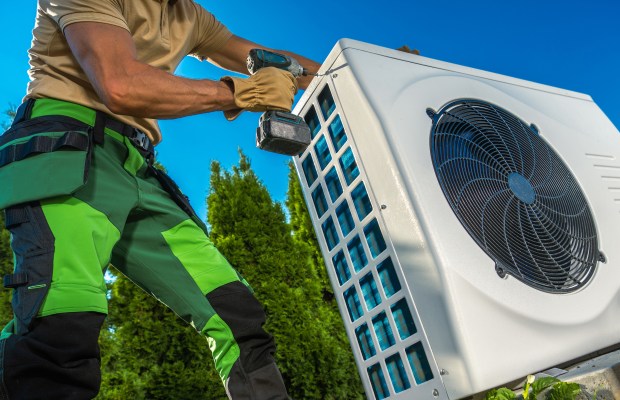Heating and cooling might sound basic, but after solar, it’s the next frontier in residential decarbonization.
By the end of the decade, a group of 25 states has a goal of installing 15 million heat pumps. Nine of those states want 90% of their residential heating, cooling, and hot water equipment to use the technology by 2040. To cope with the workload, the U.S. will add 23,000 technicians by 2032. Even then, they’ll probably be overworked.
Part of the problem is that installing heating, ventilation, and air-conditioning (HVAC) equipment is laborious and time-consuming. It doesn’t take well to automation. But much of the rest of the job might, especially quoting new projects.
“Contractors are spending three to five hours on a potential customer, and they have a sales conversion rate of 20 to 25%,” said Phil Krinner, co-founder and CEO of Arch, a software company that caters to HVAC installers. “That’s not only frustrating, that’s also a massive waste of resources.”
Buildings produce about 30% of the carbon pollution in the U.S., and Krinner saw an opportunity to reduce emissions by encouraging people to switch from fossil fuel heat to heat pumps. The technology was ready, he discovered, but contractors were not.
Three years ago, Krinner had asked 15 contractors for quotes on replacing his apartment’s heating unit with a gas furnace or a heat pump. The average price for a heat pump was higher, but none of the contractors could tell him whether it would save money in the long run.
It was a surprising omission. Krinner had spent years in the solar industry, where utility bill savings are the most important part of the sales pitch. That, coupled with low-cost solar panels and project design and proposal software, has helped the industry grow by 24% annually since 2010. If heat pumps were to realize their potential, they’d need similar data and tools.
Krinner began by learning the industry, shadowing contractors as they quoted and installed heat pumps. Eventually, he and his co-founder Sacha Schmitz recruited a team and they developed an algorithm to help contractors estimate jobs more quickly.
By using publicly available details about a home, such as its square footage and number of rooms to when it was built, Arch’s software can suggest an appropriate heat pump capacity within minutes, shaving hours off the usual quoting process, which typically involves measuring rooms and inspecting radiators and ductwork.
“I’m not claiming that we are 100%,” Krinner said. “But the interesting thing with heat pumps is that you don’t need to get it perfectly right.” That’s because heat pumps can vary their output dynamically, and the indoor components of heat pumps tend to come in just five different sizes ranging from 6,000 to 18,000 BTUs. “Because there’s five units,” he said, “I naturally have a chance of 20% accuracy.”
The startup has been plugging away with pre-seed funding, but recently raised a $6.2 million seed round from Coatue, Floodgate, Gigascale Capital, MCJ Collective and ReGen Ventures.
Currently, the San Francisco–based company is focused on the Northeast, where spotty natural gas infrastructure means many homes are still heated with oil, which is costly. “There’s a lot of traction in the market, and so the adoption of heat pumps is just really fast,” Krinner said. “From an ROI point of view, it’s very easy to compete with.”
Arch will be using the seed round to expand geographically and refine its estimating algorithm, Krinner said. It will also be adding additional features to its software, including a tool that will predict how much homeowners will save on their utility bills and a marketplace where lenders can offer financing for heat pumps. The latter two are intertwined, Krinner said, because homeowners who spend less on utilities will be more attractive to lenders, which should help drive down financing costs.
Krinner and Schmitz’s timing couldn’t be better. Not only have dozens of states committed to encouraging heat pump adoption, but also the Inflation Reduction Act offers up to $2,000 in incentives to homeowners who install them. If heat pumps were attractive before, they’re even more so now.
Still, there’s lots of inertia to overcome in the market. Many sell what they know, and that tends to be oil or gas furnaces. Helping contractors find value and profit in heat pumps could go a long way to overcoming their hesitation. Software helped speed solar adoption, and it might do the same for heat pumps.
